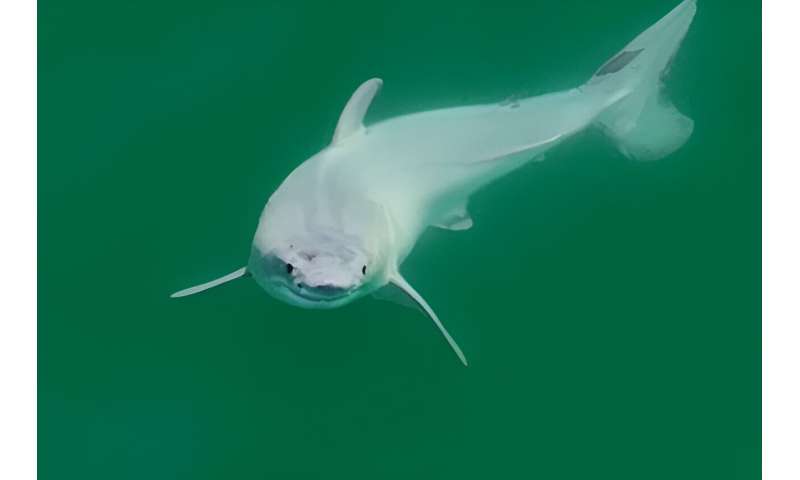Best of Last Week—newborn great white shark, Avocado the robot, diets that can alter immune system

It was a good week for the biological sciences as an evolutionary ecologist at the University of California, Riverside, working with a filmmaker from Malibu Artists Inc., observed and reported the first-ever sighting of a live newborn great white shark—Phillip Sternes and Carlos Gauna were using a drone camera to capture shark imagery when they spotted the pure white shark off the California coast. Also, a combined team of biologists from Aarhus University and the University of Oxford found evidence that culling animals who "don't belong" can be a flawed nature conservation practice—killing non-native animal species because they are thought to harm native plant species, they contend, does not take into consideration the original impact of native megafauna. And a team led by Yinan Zhang at the Institute of Vertebrate Paleontology and Paleoanthropology of the Chinese Academy of Sciences reported that an inner ear fossil from a 6-million-year-old ape revealed clues about the evolution of human movement.
In technology news, a team of engineers at USSLAB at Zhejiang University developed CamPro, a new technique to achieve anti-facial recognition at the camera sensor level. And a team of researchers affiliated with several institutions in Switzerland and the Netherlands developed a new kind of mechanical sensor that can be used to monitor infrastructure, such as bridges or buildings, potentially saving millions of batteries. A combined effort by engineers from Princeton University's ZERO Lab and EGS developer Fervo Energy highlighted the potential of geothermal power for decarbonizing electricity. And a team of environmental roboticists at ETH Zurich developed "Avocado"—a robot shaped like an avocado that attaches to treetops and maneuvers autonomously across a canopy to collect data on the difficult-to-access habitat.
In other news, a team of medical researchers at the University of Michigan explored which COVID-19 shots are most protective against severe disease. They found that the main vaccinations being used, and their boosters, were equally effective. Their main takeaway was that people getting vaccinated need to make sure they get the latest booster update. Also, a pair of climate scientists at the University of Bonn, Lasse Stoetzer and Florian Zimmermann, looked into why there are so many climate change deniers—and found that it mostly came down to people simply looking for ways to justify their own behavior. And finally, a team at the National Institutes of Health, found that switching to a vegan or ketogenic diet rapidly impacts the immune system—though they have not yet been able to determine if it is in good or bad ways.
© 2024 Science X Network